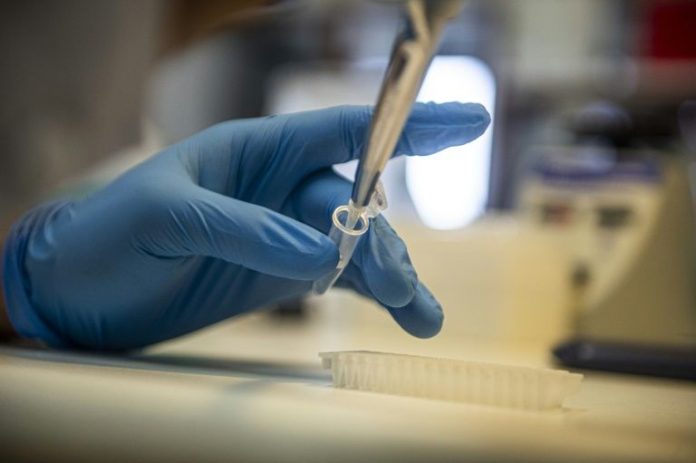
Two frontrunner vaccines — by Moderna and BioNTech/Pfizer — have already sought emergency use approval on both sides of the Atlantic. AFP File Photo
Dozens of companies, from biotech start-ups to Big Pharma, are in the race to develop a safe and effective coronavirus vaccine, both to meet urgent medical need and for the potential payday.
A US-German collaboration between Pfizer and BioNTech surged past a key milestone on Wednesday with Britain’s announcement that it would begin rolling out its vaccine — the first Western country to give the green light to an immunisation drive against the coronavirus.
Its drug is one of several candidate vaccines that have shown promising results in final stage clinical trials, raising hopes the a pandemic that has already killed nearly 1.5 million people worldwide can be tamed.
– How many in the pipeline? –
The World Health Organization (WHO) has identified 49 “candidate vaccines” at the stage of clinical trials in humans by mid-November, up from 11 in mid-June.
Thirteen of them are at the most advanced “Phase 3” stage, in which a vaccine’s effectiveness is tested on a large scale, generally on tens of thousands of people across several continents.
Two frontrunner vaccines — by Moderna and BioNTech/Pfizer — have already sought emergency use approval on both sides of the Atlantic.
Pfizer and BioNTech have reported that phase 3 trials for their mRNA vaccine showed 95 percent efficacy in preventing Covid-19 symptoms and did not produce adverse side effects among thousands of volunteers.
Britain said on Wednesday that its National Health Service will begin with 800,000 doses “early next week” and ramp up to “millions” of inoculations by the end of the year.
BioNTech/Pfizer, which said they expect further regulatory decisions for other countries in the “coming days and weeks”, expect to roll out 1.3 billion doses by the end of next year.
US biotech firm Moderna has also said its vaccine showed almost 95 percent efficacy.
The company is on track to manufacture between 500 million to a billion doses globally in 2021, it said.
Results from a European project led by the University of Oxford and AstraZeneca were more complicated.
Across two variants in the trials with slightly different protocols, the two-dose vaccine worked 70 percent of the time.
But in a part of the trial process that came about by mistake, a group whose first jab was a half-dose rather than a full one showed an efficacy rate of 90 percent.
In terms of logistics AstraZeneca has an advantage because its candidate can be stored at the temperature of a normal fridge.
Moderna’s vaccine on the other hand must be kept at -20 degrees Celsius, while Pfizer’s requires an even chillier -70C to remain viable.
Russia, which registered two Covid-19 vaccines before trials finished, has said that its Sputnik V vaccine is 95 percent effective according to preliminary data and can be stored in an ordinary fridge.
The country has started a mass vaccination programme of its military personnel.
Meanwhile, several state-run Chinese labs are also thought to have produced some of the more promising candidate vaccines.
China has been giving experimental Covid-19 vaccines to people including state employees and essential workers heading abroad since July.
The United States and Europe this week fleshed out plans to administer Covid-19 vaccines as soon as they gain approval, expected in the coming weeks.
– What kind of vaccines? –
Some methods for making a vaccine are tried-and-tested, while others remain experimental.
Inactivated traditional vaccines use a virus germ that has been killed, while others use a weakened or “attenuated” strain.
These vaccines work when the body treats the deactivated pathogen as if it were a real threat, producing antibodies to kill it without endangering the patient with full infection.
So-called “sub-unit” vaccines contain a fragment of the virus or bacteria they are derived from to produce a similar immune response.
“Viral vector” varieties deliver fragments of viral DNA into cells, often hitching a lift from other virus molecules.
For example, a measles virus modified with a coronavirus protein — the apparatus SARS-CoV-2 uses to latch on to human cells — can by deployed to provide immunity to Covid-19.
Both Pfizer’s and Moderna’s vaccines are based on cutting-edge technology that uses synthetic versions of molecules called messenger RNA to hack into human cells, and effectively turn them into vaccine-making factories.
– Safety first –
Trials of two candidate vaccines — made by Johnson & Johnson and Eli Lilly — were “paused” in October over safety concerns.
But that was not necessarily bad news, Stephen Evans, a professor of pharmacoepidemiology at the London School of Hygiene and Tropical Medicine said at the time.
“The fact that trials are paused should indicate that there should be confidence that the whole process of monitoring the safety of trial participants is working well,” he said.
Cases in which recovered Covid patients were infected a second time with a new strain also raise the question of how long vaccines’ protection might last.
In October, the US FDA said it would need to see two months of follow-up data after vaccination before giving emergency authorisation for any vaccine use.
“What is different for Covid-19 vaccines is that speed of development and potential approval is much faster due to the public health emergency,” noted the European Medicines Agency (EMA).
But even that pressing need cannot overcome the rules.
“Before approval, all vaccines in the European Union are evaluated against the same high standards as any other medicine,” the EMA said in a statement. — AFP
The post Frontrunners in race for Covid-19 vaccine appeared first on Borneo Post Online.


